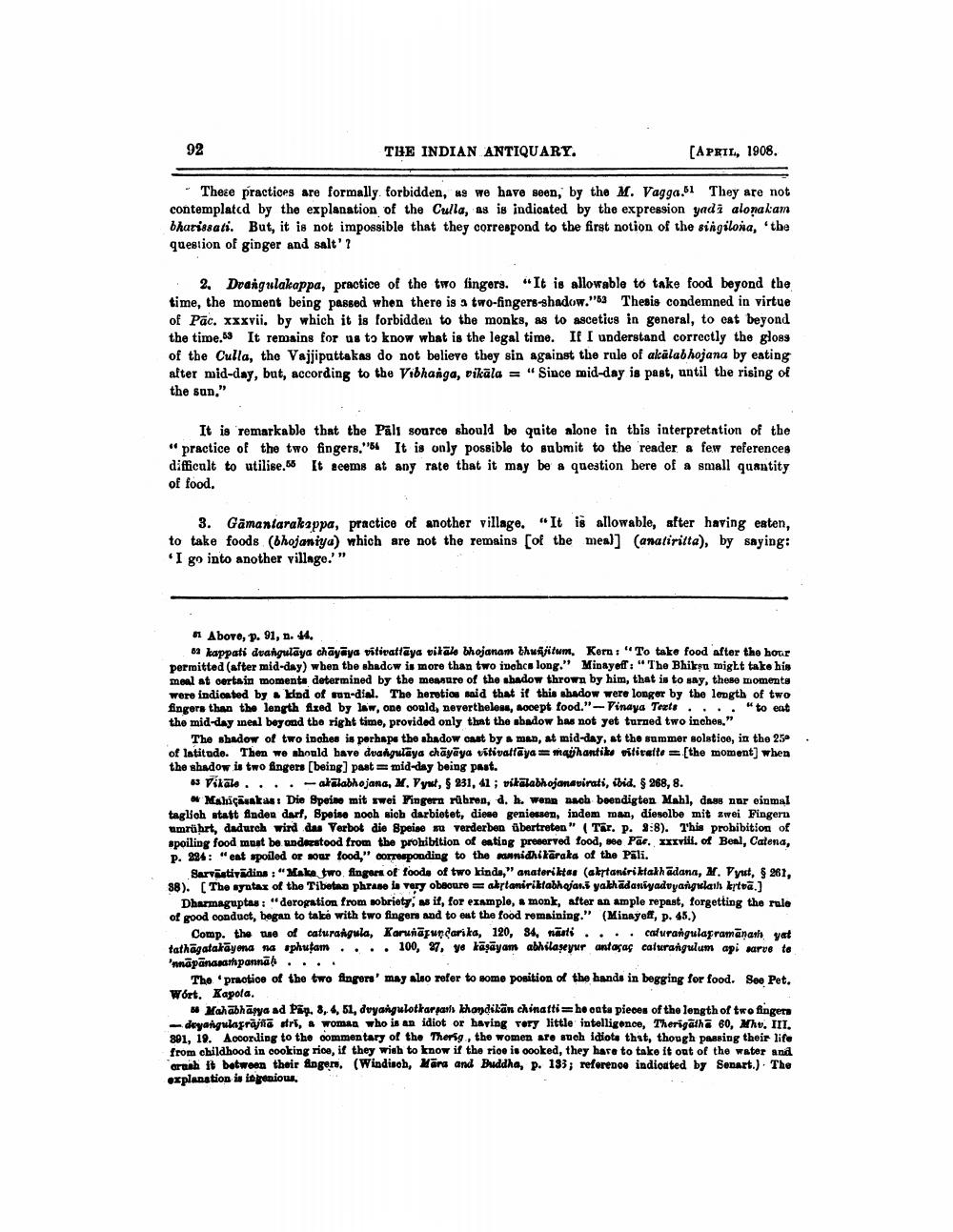________________
92
THE INDIAN ANTIQUARY.
[APRIL, 1908.
- These practices are formally forbidden, 49 we have seen, by the M. Vagga.51 They are not contemplated by the explanation of the Culla, as is indicated by the expression yadi alonakam bharissati. But, it is not impossible that they correspond to the first notion of the singilona, 'the question of ginger and salt'?
2. Draigulakappa, practice of the two fingers. "It is allowable to take food beyond the time, the moment being passed when there is a two-fingers-shadow."63 Thesis condemned in virtue of Pac. xxxvii, by which it is forbidden to the monks, as to ascetics in general, to cat beyond the time. It remains for us to know what is the legal time. If I understand correctly the gloss of the Culla, the Vajjipattakas do not believe they sin against the rule of akalabhojana by eating after mid-day, but, according to the Vibhanga, vikāla = "Since mid-day is past, until the rising of the sun."
It is remarkable that the Pall source should be quite alone in this interpretation of the "practice of the two fingers."54 It is only possible to submit to the reader a few references difficult to utilise 56 It seems at any rate that it may be a question bere of a small quantity of food.
3. Gamantarakappa, practice of another village. "It is allowable, after having eaten, to take foods (Bhojaniya) which are not the remains [of the meal] (anatiritta), by saying: "I go into another village."
Aboro, p. 91, n. 44. 63 kappati dtangulāya chāyāya vitirattaya vitale bhojanam thurjitum. Kern: "To take food after the hour permitted (after mid-day) when the shadow is more than two inchca long." Minayoff: "The Bhikyu might take his meal at certain momenta determined by the measure of the shadow thrown by him, that is to say, these moments were indicated by kind of run-dial. The heration said that it this shadow were longer by the length of two fingers than the length fixed by law, one could, nevertheless, accept food."-Vinaya Texts .... "to ent the mid-day aneul beyond the right time, provided only that the shadow has not yet turned two inches."
The shadow of two inches is perhape the shadow cast by a man, at mid-day, at the summer solstice, in the 25 of latitude. Then we should have dvangulaya chāyāya vitivattāya = majhantike vítiraite = (the moment] when the shadow is two fingers [being] past = mid-day being past.
* Vitale...-akalabhojana, M. Vyut, $ 231, 41 ; vikalabhojanavirati, ibid. $ 268, 8.
# Mahüçãuskas: Die Speise mit wei Fingern rübren, d. h. wenn nach beendigten Mahl, dass nur einmal taglioh statt finden darf, Speise pooh sicb darbietet, diese geniessen, indem man, dieselbe mit zwei Fingern umrührt, dadurch wird das Verbot die Speise m verderben übertreten" (Tar. p. 3:8). This prohibition of spoiling food must be understood from the prohibition of eating preserved food, see Pac. xxxviii. of Beal, Catena, p. 994: "eat spoiled or nour food," corresponding to the munidhikäraka of the Pali.
Sarvistiradins : "Make two fingers of foods of two kinds," anateriktas (akrtaniriktakhadana, M. Pyut, $ 261, 88). [The syntax of the Tibetan phrase in very obasure = aktaniriklabhojani yakhädaniyaduyangwlaih krtva.)
Dharmaguptas: "derogation from nobriety, as if, for example, & monk, after an ample repast, forgetting the rule of good conduct, began to take with two fingers and to eat the food remaining." (Minayeff, p. 45.)
Comp. the use of caturangula, Karunāfuocarika, 120, 84, nästi.... calurangulaframanath yat tathāgatakayena na sphutam .... 100, 47, ye kaşayam abhilaseyurantasas calurangulum api sarve to 'nnapanasampannām...
The practice of the two fingers' may also refer to some position of the hands in begging for food. See Pet. Wort. Kapola.
Mahabhāsya ad Pan, 3, 4, 51, duyangulotlar parls Ithandikän chinatti=he oata pieces of the length of two fingers deyangula rajta art, a woman who is an idiot or having very little intelligence, Therigātha 60, Mhv. III. 891, 19. According to the commentary of the Therig, the women are such idiota that, though passing their life from childhood in cooking rice, if they wish to know if the rice is cooked, they hare to take it out of the water and arnah it between their fingers. (Windisch, Māra and Buddha, p. 133; reference indioated by Separt.). The explanation is ingeniowe,




